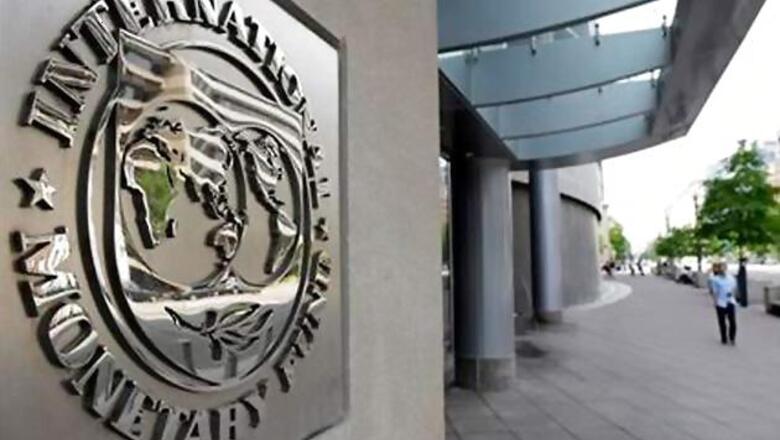
views
Washington: Global growth is slowly improving as the US recovery gains traction and dangers from Europe recede, but risks remain high and the situation is very fragile, the International Monetary Fund said on Tuesday.
Another flare-up of the euro-zone sovereign debt crisis or sharp escalation in oil prices on geopolitical uncertainty could disrupt a world economy finding its feet once again after market turmoil over eurozone budget deficits, the IMF said.
"An uneasy calm remains. One has the feeling that at any moment things could well get very bad again," IMF chief economist Olivier Blanchard told reporters as he detailed the Fund's World Economic Outlook.
"Our baseline forecast is for low growth in advanced countries, especially in Europe, but with downside risks being extremely present," he said.
The IMF revised upward its global growth forecast for this year to 3.5 per cent from 3.3 per cent in January, and to 4.1 per cent for 2013 from 3.9 per cent previously.
While the euro zone will suffer a mild recession, the IMF said it will be less severe than feared after policy actions calmed markets at the turn of the year.
European leaders toughened their fiscal rules, the European Central Bank bond buying flooded markets with money, new governments in Italy, Spain and Greece are pushing through harsh budget reforms and euro-zone leaders have agreed to enlarge their bailout fund.
The United States, meanwhile, is gradually gaining momentum while China and other emerging economies appear on track for gradual slowdowns without crashing, the IMF said.
But the gains are precarious. Should the euro-zone crisis erupt once more, it could trigger a widespread dumping of risky assets, robbing 2 per cent from global growth over two years, the euro zone suffering a 3.5 per cent decline in output, the Fund warned.
Additionally, a 50 per cent increase in the price of oil would lower global output by 1.25 per cent, it said.
To secure the global recovery, the IMF urged central banks in the United States, euro zone and Japan to stand ready to deliver further monetary easing; governments to exercise caution over the pace of budget cutbacks wherever feasible; and Europe to consider using public funds to recapitalize banks.
EURO ZONE SHAKY, US IMPROVES
Blanchard applauded European leaders for making "major progress" in building firewalls against financial contagion. "But by themselves, they cannot solve the difficulties."
Countries face a fine balancing act whereby they must cut budgets in the short term, even if it does stifle growth temporarily, in order to win back market confidence. They also must lock in credible medium-term plans for deficit reduction and undertake reforms to spur economic competitiveness.
Markets eventually will reward countries with lower interest rates, Blanchard said. The fiscal cutbacks made so far are adequate, given the shaky growth outlook. If economic prospects worsen, he recommended no further cutbacks.
European banks also are deleveraging, which will reduce their balance sheets by $2.6 trillion over the next two years and slice about 1 per centage point from growth this year alone.
Facing these headwinds, the euro zone is likely to endure a mild recession this year, shrinking by 0.3 per cent and then posting 0.9 per cent growth in 2013, the IMF said. That is a minor improvement from the 0.5 per cent 2012 contraction it had forecast in January.
Blanchard also said that euro zone leaders should take further steps toward fiscal union, which would lessen country risk. He proposed moving toward issuing common sovereign bonds, starting with euro bills, and advocated European wide bank deposit insurance and the use of public funds to recapitalize banks.
The United States, meanwhile, is "pulling itself up by its bootstraps" as domestic conditions improve, the IMF said, though the pace of growth remains constrained by an indebted consumer, high unemployment and a weak housing market.
The IMF lifted its forecast for the United States to 2.1 per cent this year, up from 1.8 per cent in January. For 2013, it nudged up the forecast to 2.4 per cent from 2.2 per cent. It sees unemployment this year holding at its current level of 8.2 per cent and inching down in 2013 to 7.9 per cent.
Despite the improvement, the fate of the United States remains deeply intertwined with that of the euro zone, where renewed problems could rob 1.5 per centage points from the outlook.
"A flare-up in the euro area from increased sovereign and bank stress could easily undermine confidence in the US corporate sector and thereby squeeze investment and demand, undermining growth," the IMF said.
The United States faces its own fiscal challenges, made worse by political fights that have delayed work on crafting a medium-term plan to reduce its budget deficit. If tax cuts expire at the end of this year and planned budget cuts kick in, the United States will face an abrupt fiscal tightening.
"Such massive adjustment could significantly undermine the economic recovery," the IMF said.
EMERGING ECONOMIES RESILIENT
The IMF is sanguine on the outlook for China. It left its growth forecasts unchanged at 8.2 per cent this year and 8.8 per cent in 2013. Strong domestic investment and growing consumption as the middle class expands are supporting growth and offsetting slowing exports.
At the news conference, the IMF's deputy director of research, Joerg Decressin, welcomed Beijing's decision on Saturday to allow its currency to fluctuate within a wider band and said more flexibility would help in rebalancing the Chinese economy toward internal consumption. He said it was unclear whether the yuan was fairly valued, since the IMF is in the midst of reviewing its methodology for currency valuations.
The IMF said emerging and developing economies as a whole would likely grow by 5.7 per cent this year and by 6 per cent next year, upward revisions from the 5.4 per cent and 5.9 per cent forecasts made in January.
Their challenge is to prevent overheating while retaining room for fiscal and monetary stimulus should dangers from the euro zone or high oil prices spill over, the IMF said.

















Comments
0 comment